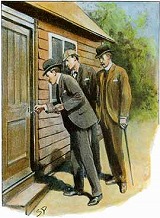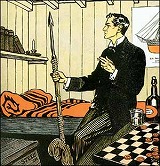Stanley Hopkins led us first to the house, where he introduced us to a haggard, gray-haired woman, the widow of the murdered man, whose gaunt and deep-lined face, with the furtive look of terror in the depths of her red-rimmed eyes, told of the years of hardship and ill-usage which she had endured. With her was her daughter, a pale, fair-haired girl, whose eyes blazed defiantly at us as she told us that she was glad that her father was dead, and that she blessed the hand which had struck him down. It was a terrible household that Black Peter Carey had made for himself, and it was with a sense of relief that we found ourselves in the sunlight again and making our way along a path which had been worn across the fields by the feet of the dead man.
The outhouse was the simplest of dwellings, wooden-walled, shingle-roofed, one window beside the door and one on the farther side. Stanley Hopkins drew the key from his pocket and had stooped to the lock, when he paused with a look of attention and surprise upon his face.

“Someone has been tampering with it,” he said.
There could be no doubt of the fact. The woodwork was cut, and the scratches showed white through the paint, as if they had been that instant done. Holmes had been examining the window.
“Someone has tried to force this also. Whoever it was has failed to make his way in. He must have been a very poor burglar.”
“This is a most extraordinary thing,” said the inspector, “I could swear that these marks were not here yesterday evening.”
“Some curious person from the village, perhaps,” I suggested.
“Very unlikely. Few of them would dare to set foot in the grounds, far less try to force their way into the cabin. What do you think of it, Mr. Holmes?”
“I think that fortune is very kind to us.”
“You mean that the person will come again?”
“It is very probable. He came expecting to find the door open. He tried to get in with the blade of a very small penknife. He could not manage it. What would he do?”
“Come again next night with a more useful tool.”
“So I should say. It will be our fault if we are not there to receive him. Meanwhile, let me see the inside of the cabin.”
The traces of the tragedy had been removed, but the furniture within the little room still stood as it had been on the night of the crime. For two hours, with most intense concentration, Holmes examined every object in turn, but his face showed that his quest was not a successful one. Once only he paused in his patient investigation.

“Have you taken anything off this shelf, Hopkins?”
“No, I have moved nothing.”
“Something has been taken. There is less dust in this corner of the shelf than elsewhere. It may have been a book lying on its side. It may have been a box. Well, well, I can do nothing more. Let us walk in these beautiful woods, Watson, and give a few hours to the birds and the flowers. We shall meet you here later, Hopkins, and see if we can come to closer quarters with the gentleman who has paid this visit in the night.”
It was past eleven o’clock when we formed our little ambuscade. Hopkins was for leaving the door of the hut open, but Holmes was of the opinion that this would rouse the suspicions of the stranger. The lock was a perfectly simple one, and only a strong blade was needed to push it back. Holmes also suggested that we should wait, not inside the hut, but outside it, among the bushes which grew round the farther window. In this way we should be able to watch our man if he struck a light, and see what his object was in this stealthy nocturnal visit.